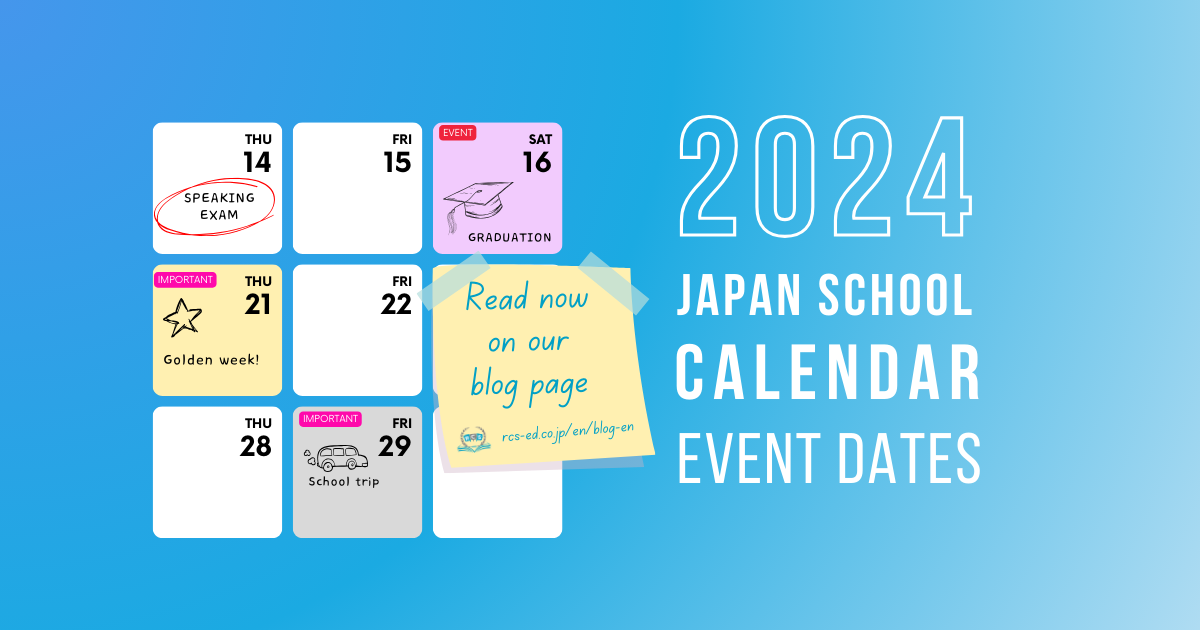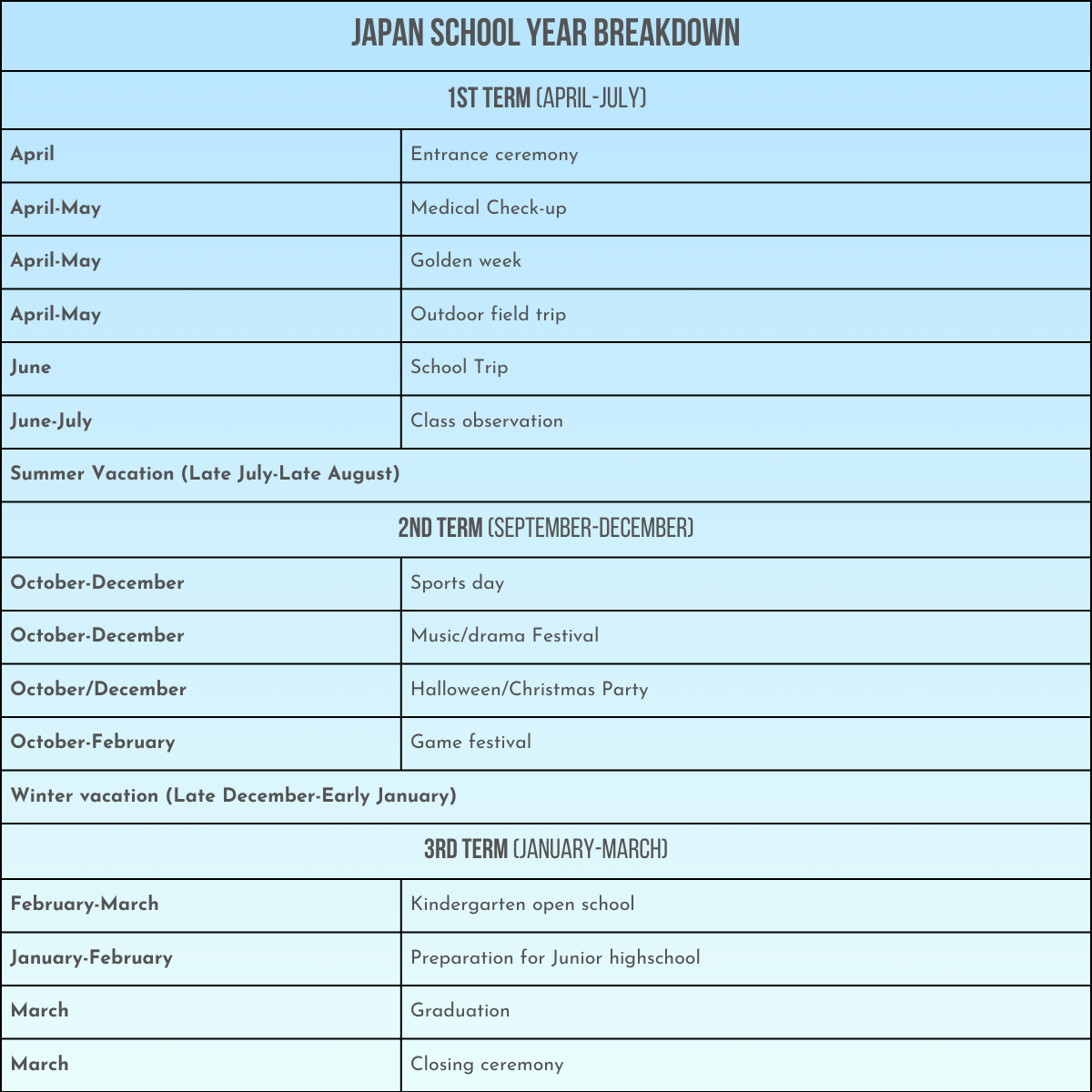

Japanese School Year Event Calendar 2024

The Japanese school system is based on 3 terms.
During these terms, there are numerous events for students to handle and prepare for. An elementary student’s life is busy, busy and even more busy! Let’s look into the most important ones!
TERM 1
The first term starts with the end of cherry blossom season in April and ends in mid-July or late July, just when the overbearing heat of summer kicks in. During the first term, there are several events that are crucial in Japan’s learning education.
Entrance ceremony
[Early-mid April]
The entrance ceremony is a vital event for 1st graders celebrating their entrance into elementary school. Parent’s usually arrive with their children. They listen to the speeches of the school staff and the school motto for the coming year.
Golden week
[Mon, Apr 29 – Sun, May 5]
The golden week is upon us, and students as well as teachers take this time off to relax and have a mini-vacation.
Elementary school Medical Check-ups
[April-May]
Students are provided with a routine medical check-up. Medical professionals do a full-body check up (including teeth) to check students’ health.
Outdoor field trips
[May-June]
Making use of the awesome weather, we delve into outdoor field trips. Field trips are essential in the progress of school for elementary school students. They are either observation for science or learning about history in social studies. These outings usually happen within one day.
For 1st-3rd graders, most outings are to places close to the school that only require walking. For example, the local supermarket, police station, and park.
4th-6th graders venture further afield. They experience locations such as the observatory, dam, museum, farm, factory, etc;. The school may require buses to transport them to and from the place.
School Trip
[Early-Mid June]
Mostly only 5th and 6th graders get the privilege to make a school trip for several days. This serves as two purposes: to enrich the student experience and to learn about significant facts about their country. Most students take hour-long bus rides to cultural sites in Japan.
For students living in the Kanto region, they usually go to Nikko, a natural hotspot filled with beautiful scenery. Students living in the Kansai region may visit Osaka or Kyoto which look and feel like the olden days of Japan. Students living in the Tohoku region are blessed with the winter weather and can go to Sendai. Students living near the coastline can experience more of the beautiful ocean in Okinawa.
Class observation
[Mid-June to Early July]
Parents may be curious how their children are doing in class. Over the span of 2 weeks, parents will come to observe the classroom. It is daunting for students to have their parents breathing down their necks. For these 2 weeks, teachers experience a quietness unparalleled to anything they have seen since the start of school.
This event also gives the parent’s time to ask questions, overall progress of their child and any concerns they have regarding activities/homework or general health about their child’s school life.
Summer vacation
[Late July-Late August]
School’s….out…for…the summer!
Don’t be fooled by this! Although school may be out for the term, schools give students a lot of homework! This may include kanji, music, math, as well as a personal journal detailing your everyday life. With Juuku (cram school), homework and the overwhelming heat, students are busier than ever!
TERM 2
The second term comes along with the end of the rainy season. Students are still lethargic from summer school. Term 2 is a test of endurance as it is the longest, spanning from late August or September to December – a whopping 4-4 ½ months straight!
Sports day for Elementary schools in Japan
[October-December]
This is the SuperBowl of events for the students and parents. Parents make their kids bento-boxes, air out their picnic blankets and salve on sunscreen to watch their kids in a day-long event. Sports days are filled to the brim with exuberant activities and sport. Students chant out their class motto, dance and cheer that would put any sports fan to shame, as kids put their life on the line to win the trophy of champions. Tug of war, relay, sack throw, hula hoop, basketball, and more are popular in this showdown.
Music/Drama festival
[November-December]
Throughout the school year, students attend music class and are assigned basic instruments. These may include the recorder, piano, melodica, triangle, cymbal, etc. Students are tasked to play a musical piece for a concert open to the parents, and sometimes to the public. Another event is the drama festival. Students in each grade perform a play of their choosing. Both the music and drama festival can be held in 1 day, but some can last up to 1 week.
Halloween/Christmas Party
[October/December (depending on the school)]
Halloween is super fun, and even more so if you can dress up! Classes will have their own individual parties (usually at the end of the day) where their homeroom teachers make games and events for the students to play. Christmas is also very similar and brings children into the Christmas spirit right before the winter vacation.
These events are a great way to incorprate English. Be sure to teach students about Halloween or Christmas traditions in your home country. Some teacher may even ask you to wear a costume during english lessons for these days!
Game festival
[October-February (depending on school)]
The Game festival is a small game-based event where each class creates an activity and students can sign-up to enjoy them. This usually happens twice in one week and can last from 1 to 3 hours. Most of these games are easily playable and don’t require much preparation. Some of these include party games like: what’s in the box? pictionary, obstacle course, jump rope, quiz show, card game, building blocks, etc;
Students can get scores by how many events they played, using a list to track their progress.
Winter Break
Christmas, but we still have to go to school? Nooo!!!
Sadly, many schools in Japan continue their 2nd term past Christmas. Becuase it is not national holiday, you may be asked to go to school. But fortunately New Years is always worry-free!
TERM 3
The 3rd term starts with a bang from the cold winds. Students to come to school with layers of clothes, scarves, hats, gloves (and the flu!). From January to mid March, this is the coldest and shortest term of the year. Albeit short, there are still many events that take place during this time.
Kindergarten Open School
[Late February-Early March]
A full day is dedicated to the Kindergarten open school. Kindergarteners are brought to view and survey the school of their district and see the layout of their new student life as an elementary student. The tasks are usually supervised by both teachers and 6th graders, who help the students navigate in groups. Parents may also attend. They are given the student handbook and necessary things such as the school approved helmet, shoes, and emergency prevention alarm.
Preparation for Junior High school
[Late January-early February]
This is a time where many 6th graders disappear to study for their Junior High School entrance exam. But don’t fret, they come back. During this period, they also do a survey and viewing of the schools in their district to see which ones they can go to after the school year ends.
Elementary School Graduation
[Mid March]
As the sakura bloom, so does the blooming of youth. This is the graduation ceremony for the 6th graders as they leave for Junior highschool. This event is a very formal affair and needs a lot of preparation. 5th graders do a send-off ceremony, giving flowers and presents to their senpai. The 6th graders perform the ceremony detailing the path they’re going to take towards their new future. Parents are allowed to watch this ceremony and give flowers after the ceremony is finished. This is a day of tear-shed happiness for the students embarking on their next journey.
Closing Ceremony
[Mid March]
The year is finally coming to an end. The students are moving up a grade, and the school is shuffling into the next school year with new classes, new teachers and new curriculum changes. The closing ceremony is the final send-off to an otherwise grandiose year.
This is a formal event, so please wear a suit or professional attire if you are asked to attend!
This year was packed right? Although there are so many events that happen during the school year, you have to admit that school can never be boring!
JAPAN SCHOOL EVENT CALENDAR







